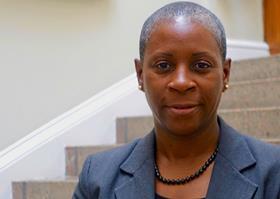Many legal employers are working hard to improve the profession’s record in diversity and inclusion. But as Maria Shahid discovers at a virtual conference, much more needs to be done to overhaul recruitment processes and expand the talent pool
The only prerequisites to a career in the law should be drive, passion and talent. While significant improvements have been made in widening access to the profession, more needs to be done to address the imbalances that still exist, in particular those favouring privately educated Oxbridge and Russell Group entrants.
So, how should legal employers go about tackling those imbalances? Part of the answer lies in redefining talent, challenging stereotypes and adopting a whole-firm approach to social mobility.
There is growing social opportunity in the legal profession, but we need to do more to challenge the stereotypes of what a solicitor should look like
I. Stephanie Boyce, Law Society

These were just some of the issues raised at a social mobility event this month jointly organised by Leeds Law Society and the Law Society of England and Wales to mark National Inclusion Week. This event was one of six sessions at their virtual Diversity and Inclusion conference, which aimed to tackle head-on diversity and inclusion issues faced by organisations and individuals.
Introducing the session, Sarah Wales of Womble Bond Dickinson, director of Leeds Law Society and D&I sub-committee member, explained that the session would provide guidance on the business case for D&I, and hints and tips on best practice.
Gateley’s Nicholas Emmerson, president of Leeds Law Society, acknowledged the complexity of social mobility as a subject. He cited Elitist Britain, a report by the Sutton Trust and Social Mobility Commission in 2019. This found that power rests with a narrow sector of the population – the 7% who attend private schools and the 1% who graduate from Oxford and Cambridge. The report also noted that the senior judiciary is the most socially exclusive of all professions.
Emmerson had never thought of himself as belonging to any elite, as a state-educated Russell Group graduate. But he acknowledged that he was fortunate to go to ‘an excellent state school, with inspiring teachers’.
In referencing the Elitist Britain report, he added: ‘A comprehensive school education is not of itself a mark of disadvantage. There are high levels of segregation even within the comprehensive school system, with many of the best performing schools in the country located in wealthy areas.’
Flying the flag for rule of law
Simon Davis, president of the Law Society of England and Wales, commented: ‘This is an opportunity for us to set an example. We are flying the flag for the rule of law, but in the context of diversity we need to set an example that we also uphold the principles of fairness, decency and kindness.’
The sector’s ‘remarkable’ profile (52% of solicitors are female, 17% from BAME backgrounds, 5% LBGT and 16% of solicitors report a disability such as a long-term physical or mental health condition or illness lasting or expected to last 12 months or more) shows that the profession is moving towards inclusion, noted Davis. But more needs to be done: ‘Diversity must become the core of the profession. We are doing a lot of the right things, but I’m sure also a lot of the wrong things. People in the sector [who] see behaviours which concern them need to point them out. This is our collective responsibility; not just the responsibility of particular working groups.’
I. Stephanie Boyce, deputy vice-president of the national Law Society, spoke of her experience as ‘proof that no matter what the challenge, it is possible to succeed if you are determined and passionate’.
Boyce, who is due to become the sixth female and first black president of the Law Society in 2021, stressed that Chancery Lane is ‘deeply committed to promoting equality and inclusion across the profession, as it is essential that we reflect the communities we serve’.
She added: ‘There is growing social opportunity in the legal profession, but we need to do more to challenge the stereotypes of what a solicitor should look like, or where they should come from. We want to show that people from all walks of life can make a valuable contribution and achieve success.’
Boyce acknowledged that the growing number of women and BAME solicitors in the profession is encouraging. But more work is needed to be done correcting the imbalances within these figures. While 17% of solicitors are BAME, just 3% are black.
This is not just about recruitment, but about how to retain and progress that talent. It’s not just the leaders’ or HR departments’ role to lead with this – it is everyone’s responsibility
Katie Nightingale, Grant Thornton
Contextual recruitment
The Law Society is working to foster improvements in recruitment practices – for example, by promoting contextual recruitment as a means of minimising unconscious bias and increasing social mobility, said Boyce.
Programmes run by the Society include the Diversity Access Scheme, a decade-old initiative. This recognises ‘talented, tenacious’ people who have a ‘strong ambition’ to become a solicitor, but without support will ‘almost certainly’ not be able to realise their ambitions.
Other initiatives include the Social Mobility Ambassadors scheme, which promotes role models from diverse backgrounds who have achieved their ambitions despite socio-economic challenges.
Boyce went on to note that the forthcoming Solicitors Qualifying Examination has social mobility, inclusion and diversity as ‘driving factors’. But she pointed to concerns about students ‘no longer being able to apply for government loans to fund their study’, which ‘could potentially undo the hard work that has been done to improve diversity and inclusion in the legal sector’.
Graduate reappraisal
Widening their graduate intake required law firms and other legal businesses to exhibit at post-1992 universities – not just Russell Group and Oxbridge law fairs – as these are ‘more likely to attract students from lower socio-economic groups, who are likely to miss out on the opportunities that these events create’.
The Law Society would also continue to host and promote the London Law Fair, Boyce added, as this provides students from a disadvantaged background with direct access to leading firms and legal businesses.
PRIME, an alliance of law firms across the UK committed to improving access to the legal profession through work experience, is also playing a prominent role in shifting perceptions. Members of the network make a number of commitments, including offering a minimum number of hours of support and financial assistance to students. Around 750 students benefit from the scheme every year.
‘Improving the diversity of the profession is both a moral and business imperative,’ concluded Boyce. ‘It is my intention to leave this profession more diverse and inclusive than the one I entered. However, this must be a shared ambition among us all.’
Supported into a legal career
The Law Society Diversity Access Scheme supports people from low socio-economic backgrounds who want to become solicitors. The scheme offers 10 diversity scholarships each year. Each place includes:
- a bursary to fund the Legal Practice Course
- work experience
- mentoring support
The application form includes an essay question. Essay questions in previous years have been on topics such as Brexit, legal aid and government resourcing.
As part of the scheme, scholars are matched with a professional mentor and have work experience during their studies. To date, host organisations have included Eversheds Sutherland, Bindmans, Kingsley Napley, Oxfam, the Government Legal Service and BP.
The scheme has helped aspiring solicitors like Ndifreke Ekaette. ‘Growing up in a family with limited means and a very disruptive home life,’ she says, ‘I was always made to believe that certain things, like university or a good job, were out of my reach.
‘I chose to ignore the social-economic boundaries that were placed on me and persevere, but when faced with the prospect of not being able to afford the LPC, I felt as if my efforts had been wasted.
‘The Diversity Access Scheme has given me the chance to succeed in a legal career and to break the cycle of poverty and underachievement in my family and provide a life for myself that is far from what I ever could have imagined growing up. It is truly life changing.’
Applications for the next cohort of Diversity Access Scheme awards will open in February 2021. Click here for more details.
Pause for thought
‘There is no right way to build a socially inclusive profession, but it’s important always to be thinking “what could I do?’” said Rosie Clarke, head of Inclusion and Diversity Services – North at membership network Inclusive Employers. She cited a list of questions attendees should consider when thinking about recruitment, culture and performance management.
One is: ‘Where are you fishing for your talent and how wide is that talent pool?’ As well as non-Russell Group universities, Clarke advised appealing to younger students, particularly at A-level.
‘The difficulty with socio-economic circumstances is that they stay with us at least until at least we start to earn our own money,’ she stressed.
When collecting data on candidates, Clarke recommends including socio-economic status questions, encompassing schools attended, and parental education and occupation.
She urged attendees to consider how they define talent during the recruitment process: ‘It’s a question that is full of unconscious bias and presumptions, which are potentially going to exclude certain people. It’s about defining potential rather than talent. When people don’t have opportunity, that often means that they have the skills to do something but haven’t as yet been able to demonstrate those skills. That’s where opportunity comes in.
‘Focus on potential – not what they’ve done, but what they could do.’
Leading by example
Katie Nightingale, people consulting manager at accountancy firm Grant Thornton, spoke about her organisation’s social mobility journey, which started with a new leadership in 2014: ‘We really needed to make sure that we were leading from the top.’
However, Nightingale highlighted the importance of a whole-firm approach: ‘This is not just about recruitment, but about how to retain and progress that talent. It’s not just the leaders’ or HR departments’ role to lead with this – it is everyone’s responsibility.’
Grant Thornton employs a reverse mentoring model which Nightingale believes has been ‘really beneficial in terms of opening up the conversation’.
Her advice is to hold your nerve: ‘It does take courage to make that change. Access organisations that have already done so. You don’t need to reinvent the wheel – find things that will work for you. Take the time to challenge what’s going on. Find allies who can support you, in particular at senior level.’
Making the business case
Law Society D&I adviser Chris Seel concluded the session by reminding attendees of the reasons why there is a good business case for D&I. This incorporates legal and regulatory obligations under the Equality Act 2010, principle 6 of the SRA Principles and Chapter 1 of the Code of Conduct.
There are also potential benefits in terms of ‘attracting best talent’, as well as ‘widening the pool of talent’, he added. Checking representation on websites, making D&I policies and practices available online and asking recruiters what they do in this space were just three of his suggestions.
‘Once you have people through the door you need to retain them. People will perform to the best of their ability if they feel they can be themselves,’ he noted. ‘If people don’t feel included, they will just leave.
‘Research shows that there is a definite “stay” gap with black solicitors. They get through the door, but don’t stay because the culture is not inclusive.’
D&I is as important to a business as client development, financial management and legal knowledge, Seel concluded. It was clear from this conference that this message cannot be reiterated too many times.
Maria Shahid is a freelance journalist
































4 Readers' comments